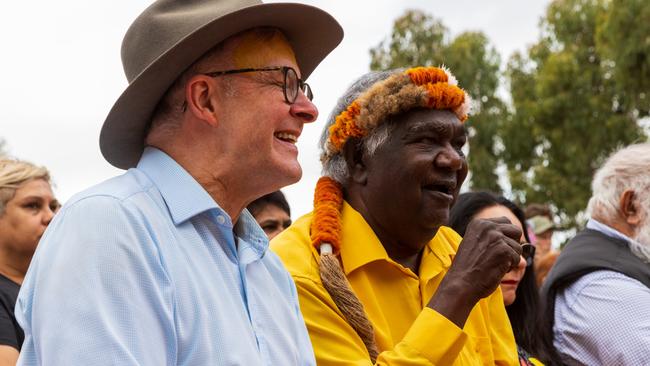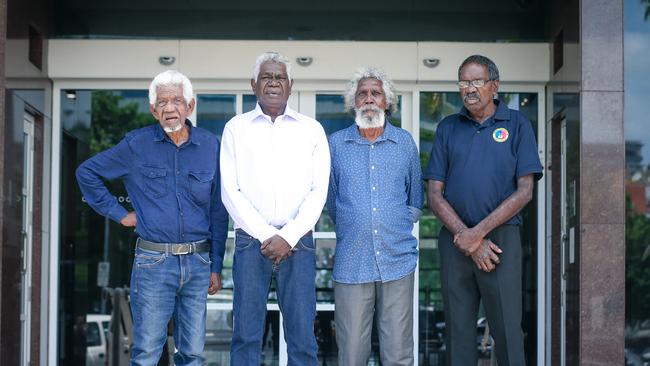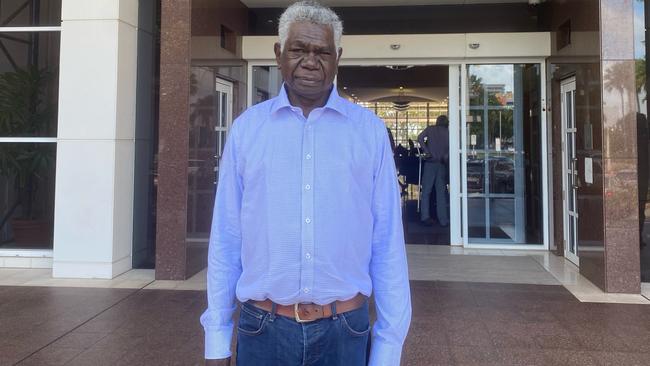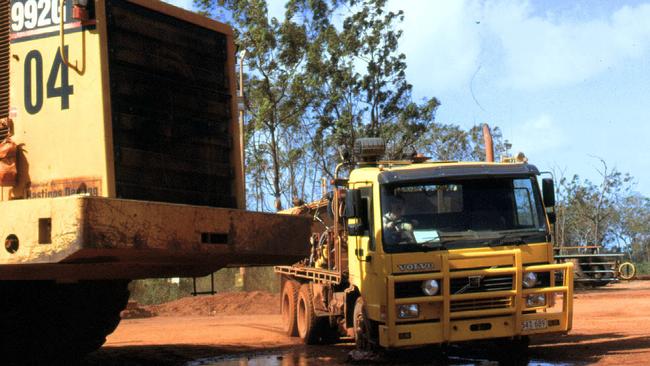Galarrwuy Yunupingu seeking compensation from Nabalco for mining on Gove Peninsula
A native title case going through an NT court could have a huge impact on historic acts, with a claim for millions in compensation for the destruction of land in Northeast Arnhem Land.
Northern Territory
Don't miss out on the headlines from Northern Territory. Followed categories will be added to My News.
Landmark native title case could have “huge” ramifications for compensation, potentially affecting every act by the Crown in the Northern Territory between 1911 and 1978, a court has been told.
The Federal Court is hearing a claim for compensation launched by former Australian of the Year Galarrwuy Yunupingu on behalf of the Gumatj clan over the Commonwealth’s decision to allow Nabalco to mine their country in Northeast Arnhem Land in the Northern Territory in 1968.
Dr Yunupingu argues the Native Title of the Gumatj clan was property and it was acquired by the Commonwealth without consent.
The Commonwealth argues native title is “inherently defeasible” and so susceptible to extinguishment by the acts of the Crown that it should not be recognised as a form of property for the purposes of the Australian Constitution.

During the Federal Court hearing in Darwin on Monday, Justice Debra Mortimer asked the Commonwealth’s counsel Nitra Kidson KC about the significance of this point.
“Certainly, from a compensation perspective it’s potentially huge,” Ms Kidson said.
“The position of the applicant is, although they have a handful of acts, if one follows through … potentially, other than in areas where all native title was extinguished …. you have invalidity of everything done by the crown in relation to land between 1911 and 1978,” she said.
“We’re talking about power exercised … to do things like build roads.”
The Commonwealth took responsibility for the Northern Territory from South Australia in 1911. The NT was granted Self Government in 1978.

In 2019 the High Court upheld a Federal Court decision to award $2.5 million in compensation for the extinguishment of Native Title on about 1.3 square kilometres of land at the tiny Northern Territory community of Timber Creek.
While the Timber Creek case related to acts after the Northern Territory Self Government Act of 1978, the Yunupingu case pre-dates Self Government.
Dr Yunupingu argues the Commonwealth breached section 51 (xxxi) of the constitution, failing to act “on just terms” when it acquired the land for mining.
But the Commonwealth says section 51 does not apply to land in the territories.
The Commonwealth’s lead counsel, Stephen Lloyd SC said the court was still bound by a 1969 case involving a group of Papuans who objected to the establishment of a copper mine on Bougainville Island. At the time Papua New Guinea was an external territory of the Australian Commonwealth.
In that case – Teori Tau vs Commonwealth – the Papuans argued the Commonwealth had failed to act on just terms when it allowed mining company Rio Tinto to begin operations on Bougainville Island.
The High Court rejected their claim saying section 51 of the constitution did not apply to the territories.

Mr Lloyd told the court the matters in the Teori Tau case were “materially identical” to the Yunupingu case and that there was “a clear and binding authority”.
Dr Yunupingu’s lawyers will argue the precedent set in Teori Tau was overruled in the 2009 case – Wurridjal vs Commonwealth – where three plaintiffs from Maningrida successful argued against the acquisition of their township for a five-year lease as part of the Northern Territory Intervention, on the basis it had not been acquired “on just terms”.
But Mr Lloyd told the court that although the High Court found in favour of the plaintiffs in Wurridjal, there had not been a majority view that the Teori Tau decision was invalid.
Justice Mark Moshinsky asked Mr Lloyd why a Commonwealth Law Reform headnote had said the Teori Tau decision had been overturned in the Wurridjal case.
He said the Commonwealth was not of that view.
“Various academics have said in passing that Wurridjal overruled Teori Tau … but none of those discussions involve an analysis of what I have been arguing, and we say you are bound by: Principles … and not by a passing remark of an academic,” he said.
Justice Mortimer asked why the question about whether Teori Tau applies wasn’t removed from the Yunupingu case, given it was a question that would ultimately need to be decided by the High Court.
But Mr Lloyd said the issue at hand was a Federal Court issue, not a High Court issue.
Legal experts have previously estimated the claim could be worth up to $700m and could open the door for similar claims.
Dr Yunupingu first signalled his intention to seek compensation during a speech at the Garma Festival in 2019.
“I’ll be fighting for the land rights case in which the mining company have come to Gove Peninsula without asking properly of the landowners of the place,” he said at the time.
“They have all come, getting (the) OK from the PM and the government of the country, to come all the way up to start digging and assaulting the country.”
Dr Yunupingu said Nabalco had destroyed sacred sites at Galupa where the mine sits, “ripping some land unmercifully”.
“They have damaged our country without seeking advice from us and they have damaged all of our dreamings, dreamings that were important to Aboriginal people,” he said.
Dr Yunupingu also described the destruction of sacred land near a tree the Gumatj called Dhanburama, in honour of a female spirit ancestor.
“One of the important areas was … where they fired a rock and blew it out and took the rocks away in pieces,” he said.
The tree was saved when Dr Yunupingu’s father, Mungurrawuy, stood in front of a bulldozer.
The issue was the subject of Australia’s first native title case, Milirrpum v Nabalco Pty Ltd – better known as the Gove land rights case – in 1971 when judge Richard Blackburn ruled against the local Yolngu people, rejecting their claims in part based on the doctrine of terra nullius.

The Milirrpum case was overturned by the High Court’s decision in the 1992 Mabo case, when terra nullius was found to be false.
The Yunupingu case relies on the proposition that the native title of the Gumatj clan was property and acquired by the Commonwealth without consent.
The Commonwealth argues section 51 (xxxi) of the Constitution does not apply in the territories, pointing to the 1969 Teori Tau case where the High Court rejected the claims of Papuans from Bougainville Island who had opposed the construction of a copper mine.
The Gumatj – supported by the neighbouring Rirratjingu clan and the Northern Land Council – say that ruling was overturned in the 2009 case Wurridjal vs Commonwealth, where three plaintiffs from Maningrida successfully argued against the acquisition of their township for a five-year lease as part of the Northern Territory Intervention, on the basis it had not been acquired “on just terms”.
The Commonwealth also argue that native title is “inherently defeasible” and so susceptible to extinguishment by the acts of the Commonwealth that it should not be recognised as a form of property for the purposes of the Constitution.
The NT supports the Commonwealth’s position.
The hearing continues.
Matt Cunningham is Sky News Northern Australia Correspondent





